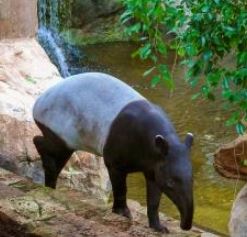A SPANISH zoo has announced it will try to use assisted reproduction of its ‘living fossil’ tapirs after impatiently waiting for several years for them to mate.
Bioparc Fuengirola made the announcement on ‘International Day of the Tapir’, in an effort to raise awareness of the species’s status as being in danger of extinction.
The zoo has been home to the Malaysian tapir since 2003. Mating between Rawa and Pi, the two Malaysian tapirs to whom Fuengirola is home, has been attempted unsuccessfully for years. This year the zoo will try assisted reproduction to boost the species, but the technique is more difficult than amongst other animals.
Fuengirola staff are part of a group of 23 zoologists taking part in a conservation programme of the animals, and are the only members from Spain.

The wild population of the unusual looking animals, which are odd toed and whose females are larger than males, has halved over the past 30 years.
Today little more than 2,000 Malaysian tapirs exist, 45 of which belong to the European Association of Zoos and Aquaria (EAZA).
Despite the drastic change in their population, the animals themselves have hardly evolved from the makeup of their ancestors 55 million years ago, practically making them a ‘living fossil’ in the words of Bioparc Fuengirola.
READ MORE:
- Ukrainian refugee zoo animals find homes in exotic rescue centre in Spain’s Alicante
- ‘Orgy of blood and death’: Outrage over mass slaughter of trapped animals during hunt in southern Spain
- Police raid illegal Vietnamese Pig farm and seize 12 animals in Murcia area of Spain
Click here to read more Malaga News from The Olive Press.








